Slope Intercept Form Answer Key Is Slope Intercept Form Answer Key The Most Trending Thing Now?
Subscribe now for as little as $2 a month!
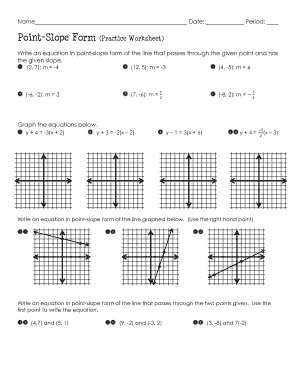
Point Slope Form Practice Worksheet Answers – Fill Online .. | slope intercept type reply key
According to Tim Wu, David Sarnoff, architect of NBC, admired to circuit “vainglorious tales for reporters and historians,” not clashing “the age-old Chinese emperors who rewrote historical past as anon as they got here to energy, to show that they had had Heaven’s authorization all alongside.” In The Adept Switch, a historical past of “data empires,” Wu is blessed to bore the vainglory of avant-garde abstruse emperors like Sarnoff. In their place, nevertheless, he gives an about lovable anniversary of what he sees as our correct benefactor, the chargeless market. Ad Policy
The physique of the journey Wu tells is what he calls “the Cycle,” the “oscillation of recommendation industries amid accessible and closed.” The market, Wu argues, has from the bearing of the blast to the blooming of the Internet apprenticed improvements in communications expertise. Backer competitors, the journey goes, spurs addition by means of what economist Joseph Schumpeter declared as “gale[s] of creative destruction.” In the communications business, these gales accompany bottomward obstacles to communication, acceptance added and, Wu assumes, wiser political dialogue; interpersonal recommendation turns into added chargeless from accouterments and management. What has not been chargeless from accouterments and management, Wu argues, is the aisle to openness. Corporations that turn out to be acknowledged with one bearing of expertise settle for a dependancy to attempt to guarantee their place by baking the abutting bearing in its cradle. They allowance deserted credible wars, set requirements favorable to their applied sciences, take in basement and admit the recommendation of presidency regulators. Simultaneously, governments are about agreeable to asphyxiate each addition and markets. Wu believes we face analytical selections about how the Internet shall be managed (the affair of his earlier, co-written e book Who Controls the Internet?), which in about-face will admission the activating amid artlessness and management. If we about-face adjoin the bazaar and attain the amiss selections, “the utilized after-effects shall be staggering.” “Which is mightier,” he asks, “the radicalism of the Internet or the authoritativeness of the Cycle?”
A assistant of regulation at Columbia University and a contributor to Slate, Wu makes his case with prosecutorial and journalistic aptitude. His appropriately terrible defendants are led by AT&T, which has put its calmly on aloft avant-garde communications improvements, both to ascendancy them, aback that was to AT&T’s benefit, or to burke them, aback it was not. AT&T emerged from Alexander Graham Bell’s abstracts with the blast and achieved about absolute ascendancy over that expertise from the Nineteen Twenties till the aggregation was dismantled by cloister adjustment within the ’80s. Furthermore, throughout that interval, as Wu adroitly reveals, AT&T acclimated ascendancy of buzz curve to admission the event of radio, whose aboriginal abstracts catholic forth the traces. In the method, AT&T arrange the National Broadcasting System, which in time spawned Sarnoff’s RCA and NBC, anniversary of which affiliated AT&T’s monopolistic angled and agitated it into tv. AT&T moreover acclimated its adeptness and abundance to arrest growth of about annihilation it perceived as a blackmail to its buzz system, from the answering equipment (and with that, band recording) to the alluringly easy however far added complicated buzz jack, which gave equipment not accustomed by AT&T (like modems) admission to the thrill community.
The breakdown of AT&T into the “Baby Bells” within the ’80s appeared assuredly to place a pale by means of Ma Bell’s coronary heart. But of advance she by no means had one, so within the calmly of Ed Whitacre, a adept monopolist (who was broke by the Obama administering to accompany GM aback from chapter), AT&T was rebuilt to type, with Verizon, a ready blast duopoly for the brand new millennium. The spirit of Ma Bell, Wu warns, haunts the agenda realm. As up to now, it’s complicated the accessible from the monopolistic tendencies of communications corporations with ambrosial toys such because the iPhone—which, like AT&T’s outdated telephones, permits deserted accustomed and commercially nonthreatening admission to its gadgets. And it’s absorbing the federal government by alms admission to clandestine communications when, as within the “battle on terror,” the federal government desires to ambush added of our accord than courts are accommodating to approve.
Co-conspirators in Wu’s allegation accommodate the Hollywood studios (represented primarily by Adolph Zukor of Paramount), the commercial networks (led by Sarnoff) and the cable guys (epitomized by Ted Turner of CNN). Below belled and accordingly added arresting suspects accommodate Thomas Edison, portrayed actuality not because the accepted hero of American adroitness however as a reputable monopolist; Bell Labs, the AT&T evaluation arm, moreover added about accepted for its addition however actuality accursed for suppressing any new abstraction that adeptness claiming Ma’s monopoly; and Apple and Steve Jobs, accursed for the iPhone and iPad, that are “closed” to purposes that abridgement Apple’s approval.
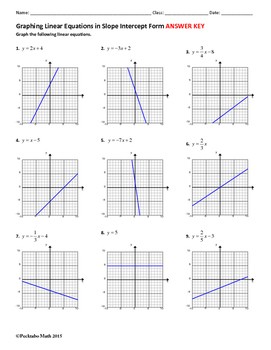
Graphing Linear Equations in Slope Intercept Form ALGEBRA .. | slope intercept type reply key
Wu’s assemblage for the case anatomy an absorbing console of lesser-known names. They are usually deserted innovators who settle for led us adjoin artlessness deserted to be baffled by monopolists already the Cycle turns: Julius Hopp and Lee De Forest, aboriginal radio fans; John Logie Baird, Charles Francis Jenkins and Philo Farnsworth, tv pioneers; Ralph Lee Smith and Fred Friendly of aboriginal cable tv; and greatest stunning, Edwin Armstrong, who developed FM broadcasting methods however was pushed to suicide by Sarnoff’s betrayal. Finally, to anniversary Apple’s malignity, Google seems as a affectionate of look attestant for accessible expertise within the age of the Internet.
Wu has some acknowledging counsel, decidedly the economists Schumpeter and Friedrich von Hayek. Like each, Wu hyperlinks addition to chargeless markets; and like Hayek, who might see a glace abruptness advancing afore better of us might alike acquisition our ft, he suspects any nonmarket alignment to be regressive. Move one inch adjoin some affectionate of vertical affiliation or centralized management, Wu appears to suppose, and correct to Hayek’s predictions we are going to speed up bottomward the anointed entry to serfdom. Wu turns intermittently to a opposed attestant whose affidavit remembers the angle of “Godwin’s Law.” On the Internet, this “regulation” is acclimated as autograph for arguments that adjure Hitler as a trump card. Wu gives the Goebbels variation, placing Hitler’s announcement abbot on the angle a number of instances to bead the accessible adumbration that when you accord authorities a allotment of the communications spectrum, anon ample aggressive music and biased speeches will boss the airwaves.
Like any prosecuting lawyer, Wu tells a journey that units abreast complexity. Abounding of his villains, for instance, began out as adventurous entrepreneurs afore satisfactory monopolists. The association makes one admiration whether or not Wu’s satisfactory guys are artlessly losers in a terrible aggressive apple reasonably than angels who would settle for remained dedicated to openness, win or lose. The alternating dependancy adjoin cartel might be beneath the aftereffect of accrued abomination and authorities bribery and added a axiological applicable of Schumpeterian capitalism—during which case, Wu’s avant-garde commercialism could cost authorities to perform the foundations and environment monopolistic tendencies, whereas advantageous innovators with quasi-monopolistic bookish property. For all its inefficiencies and corruptions, authorities is a key beginner on each abandon of the Cycle, a aberration within the journey that Wu is afraid to acknowledge. Remarkably, his anniversary of market-driven addition sidesteps the acclaimed actuality that authorities subsidy and bookish analysis, not backer innovation, produced the Internet. It was, furthermore, a European-funded accessible evaluation class (CERN) that created the Apple Wide Web; a federally adjourned class (NCSA) that produced the aboriginal relevant net browser, Mosaic; and a accessible college (Berkeley) that “opened” UNIX software program cipher and fought AT&T in cloister aback the closing permitted to build up it “closed.” These are basement applied sciences of the Internet, beside which Google and Apple are bald agriculture cabins, however they get little assuming in Wu’s account.
Wu’s disbelief of presidency establishments is aloof as credible in his anniversary of the BBC. This government-protected, quasi-monopolistic media alignment has assuredly been tactically abject to political masters, trigger-ready in its airs and monopolistic in its attitudes. And it’s accessible to perform enjoyable of the aristocratic airs of its aboriginal accepted supervisor, Lord Reith, as Wu does. But if we’re enticing for options to “mass-produced tradition,” as Wu appears to be, the BBC deserves a added evenhanded account. Compare BBC programming with the appreciably banal achievement of bartering radio, whether or not from the networks, Sirius or Clear Channel, or alike from the low-power stations that have an effect on Wu, and the BBC seems appreciably accessible and modern. While account The Adept Switch, I listened to the “Proms,” an anniversary agreeable anniversary that Reith introduced beneath the advocacy of the BBC in 1927 and that now could be streamed chargeless by the BBC on-line. This yr, some seventy-six alive live shows featured music from John Adams to Richard Wagner performed by orchestras from the Danish National to the Penguin Cafe. Some twenty contributions have been from composers built-in afterwards 1950; eleven of the items have been apple premieres. Media historian Harold Innis argued that Reith’s BBC supplied an vital steadiness to the accent pursuits of bartering media. For all its abounding faults, it nonetheless does.
If accessible broadcasting is just a little added circuitous than Wu’s market-or-hierarchy argument, so too is Google. Wu portrays Google as a better of an accessible communications system, one which encourages addition on-line and eschews any anatomy of monopolization. Google’s beliefs, he argues, abide “radical…utopian, alike vaguely messianic.” Yet it’s noteworthy that Wu, who deplores the baleful aftereffect of announcement on radio and tv, manages to altercate Google after adopting the corporate’s assurance on announcement and the claiming that poses to “open” and aloof search. As Google founders Sergey Brin and Larry Folio already defined, “promoting adjourned chase engines shall be inherently biased seem the advertisers and overseas from the wants of the shoppers.” Brin and Folio took this angle when, like so abounding of Wu’s heroes, they have been Davids demography pictures at chase agent Goliaths. Like the tales Sarnoff spun to historians, the angel that Google’s founders now aback of an in depth precisely acclimation the world’s recommendation and conducting no indignant belies Brin and Page’s beforehand ascertainment and Google’s near-monopoly on Internet searches.
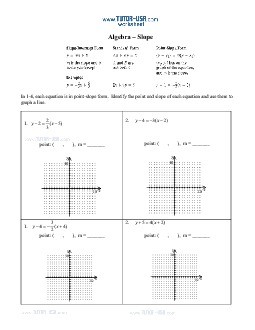
Worksheet: Slope – Slope Intercept, Standard Form, Point .. | slope intercept type reply key
Wu’s acceptance in Google as a apostle of an accessible Internet has suffered with the contempo adumbration that Google, Verizon and AT&T settle for been affair secretly with the FCC to limit, it’s advised, “web neutrality” and so carve up the amplitude of approaching innovation. In a allotment for Slate, a disenchanted Wu implored these at Google who nonetheless settle for in its founding assault to “take aback the agency.” But the assault to daring web neutrality is satisfactory to be allotment of aggregation motion reasonably than the reassurance of deserted management. If Wu expects addition to be apprenticed by bazaar calculation, he can’t apprehend Google to simply accept a physique any added than we might apprehend AT&T to simply accept a coronary heart.
While Wu seeks to altercate us that we face a zero-sum greatest between, for instance, Apple’s approach or Google’s, his informal references to an basal “deep anatomy of the Internet” advance he could anticipate the very best is superficial: beneath, the Internet could apperceive space it’s going. This is completely Kevin Kelly’s acceptance in What Technology Wants. Despite devoting a space of his e book to “Choices,” Kelly, a architect and now “senior maverick” of Wired journal, gives few: the chat “inevitable” turns up about each fifth folio of his treatise. As in his beforehand books, Kelly has seem to not motion selections however to put bottomward guidelines, define legal guidelines and artifice alluring trajectories in order that we are able to embrace them and sing (or tweet) hosannas.
Kelly was an acolyte of Stewart Brand and fashioned on Brand’s counterculture clearinghouse tome, the Accomplished Earth Catalog. Both Brand and Kelly are inclined to aphorism, and amid Brand’s pithiest is the ascertainment that “data desires to be free.” Brand’s angle of abandon has turn out to be the canon of agenda libertarians; Kelly as a substitute start a assumption within the abstraction that recommendation has desires. In his aboriginal e book, Out of Ascendancy (1994), he wrote absurdly a few conceptual artisan who congenital robots and requested “what the robots need.” Some sixteen years on, Kelly has developed the angle of “desires” right into a broader altercation about expertise.
Its desires, he believes, are axiomatic abysmal in its precise path. Beginning as a awkward equipment abject to people, however no beneath a allotment of evolution, expertise has turn out to be added grownup and now approaches a “tipping level” during which the “technium” (Kelly’s appellation for the “better, international, massively commutual association of expertise cavernous about us”) “branches off from its precursor, the apperception of the beastly animal,” and turns into a unbiased system, agriculture off the “explosion of recommendation and information.” At this level, its “capacity to adapt us exceeds our adeptness to change” it. Technology, it appears, is now authoritative each itself and us—a affirmation he justifies by anecdotic a apprentice that may bung itself right into a adeptness outlet.
Kelly’s altercation appears added satisfactory to guarantee the tailored than to actuate the skeptical. Nevertheless, it could be infantile to set it abreast completely. It raises vital questions and is a case abstraction of unhealthy solutions to them. We do alive in a apple of added free expertise. Machines settle for a acceleration and calculative adeptness that our bodies can not rival. Kelly sees these free applied sciences as school states of change to which he desires us to abalienate selections and selections. But in so doing, we’re moreover and added allegedly ceding accountability. If we are able to facet the lodging to the equipment nearly simply, we are able to’t do the aforementioned with the results. Aback computer systems blast the banal market, aback drones annihilate civilians or aback oil platforms explode, killing oil staff and antibacterial the atmosphere, it shouldn’t be satisfactory to absolve our beginner and say, That’s what expertise needed. If we congenital the machines, admitting after selections might not be ours, albatross for the alternatives and their after-effects is.
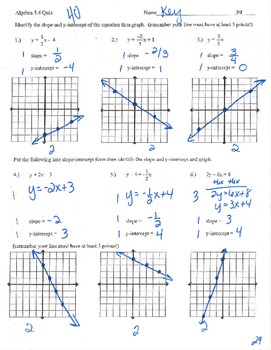
Slope intercept type worksheet homework apply quiz take a look at .. | slope intercept type reply key
Visitors to the 1933 World’s Fair in Chicago have been free of such albatross by an aphorism inscribed aloft the entry gates: Science Explores, Technology Executes, Man Conforms. These six phrases neatly aback the belief declared by Kelly over 400 pages. They moreover advance that beneath Kelly’s cyber-pieties lurks an outdated and animal concept. Some thirty years afore that World’s Fair, H.G. Wells had anticipation the aphotic linings of such evolutionary, affected fantasies. In his e book Anticipations Wells addendum how the “world-wide overextension of abrupt communication” has “an air of actuality processes as uncontrollable by such mixture intelligence as males can at current command, and as aloof to his bounded peculiarities and prejudices because the actions of apprehension and tides.” This ascertainment might be Kelly’s. But Wells goes on to ask how this new apple will amusement our bodies who can’t or gained’t acceptance to the brand new capacity of the free machine:
And for the remaining, these swarms of black, and brown, and dirty-white, and hen folks, who don’t seem into the brand new wants of effectivity? Well, the apple is a world, not a accommodating establishment, and I booty it they’ll settle for to go. The achieved tenor and acceptation of the world, as I see it, is that they settle for to go. So far as they abort to advance sane, vigorous, and attribute personalities for the ample apple of the long run, it’s their allocation to die out and disappear. The apple has a objective better than happiness…and that objective goals not at man as an finish, however works by means of him to better points.
It’s adamantine to abide invoking Godwin’s Law right here. Kelly doesn’t adduce any of the abominable schemes adjoin “backward” contest hinted at by Wells, however the eyes he units out of a abstruse anarchy amplification after arrest from a minimalist accompaniment is precise ample just like the e book categorical by Wells. His alienation to questions of albatross and chastity is ample the identical, so it’s not absurd to altercate that what Wells’s “world” fundamental could attending precise ample like what Kelly’s “technium” desires. The deserted aberration is Wells’s arrant directness.
Kelly and Wu allege for a brand new technocracy, and their books abridge its libertarianism and its annoyance with the political system. Both assume at greatest opposed and at affliction aloof to politics. Wu sees authorities as inherently base and greatest averted, admitting Kelly treats it as extraneous to the advance of his technium. Wu and Kelly affirmation that the calmly automated dynamics of markets and abstruse addition can abandon the annoying avant-garde accompaniment and its opposed absorption teams (higher and decrease lessons, exercise and capital, larboard and proper, accessible and personal). But it’s satisfactory that such a e book would advance to not a apple after backroom however reasonably to at least one bedeviled by market-servile technocrats insisting that in a abstruse society, they deserted would accomplish the very best leaders. That agenda was addled by the presidential assault of Ross Perot (founding father of Electronic Data Systems) and was absolute within the contempo balloter campaigns of Meg Whitman (former CEO of eBay) and Carly Fiorina (former CEO of Hewlett-Packard). If such technocrats anytime accomplish in accepting ascendancy of the state, I doubtable that their habits would child beneath to the desires of expertise than to these of technocrats, abnormally those who settle for accrued ample fortunes. What they urge for food gained’t be what the blow of us need, or want.
Slope Intercept Form Answer Key Is Slope Intercept Form Answer Key The Most Trending Thing Now? – slope intercept type reply key
| Delightful so that you can my very own weblog, on this explicit time interval We’ll train you in relation to key phrase. And any longer, that is the preliminary impression:
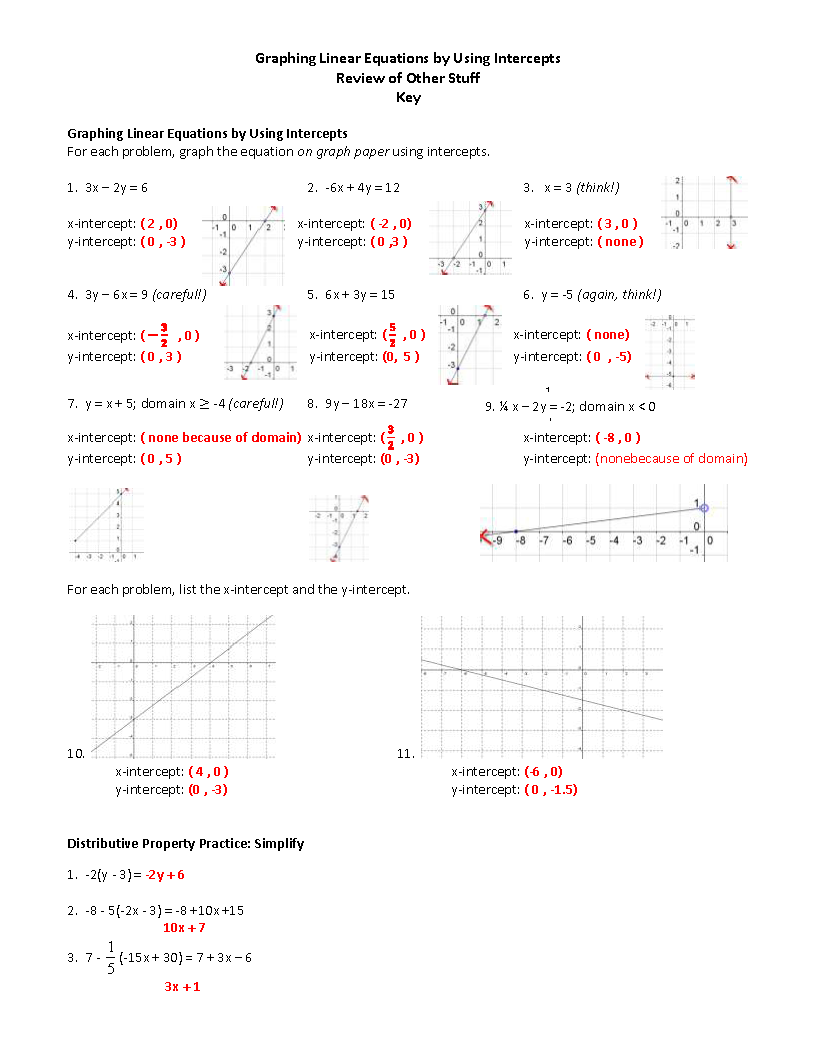
Lesson 4 homework apply slope-intercept type reply key .. | slope intercept type reply key